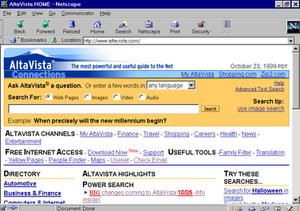Alta Vista

Top: 2002–2013 AltaVista logo
Bottom: The AltaVista web portal in 1999 |
|
|
Type of site
|
Search engine |
|---|---|
| Available in | Multilingual |
| Founded | 1995 |
| Headquarters | Palo Alto, California, U.S. |
| Key people | Paul Flaherty, Louis Monier, Michael Burrows, Jeffrey Black |
| Parent |
Overture Services (2003) Yahoo! (2003–2013) |
| Website | AltaVista.com |
| Alexa rank |
|
| Advertising | Yes |
| Registration | No |
| Launched | December 15, 1995 |
| Current status | Defunct (July 8, 2013) |
AltaVista was a Web search engine established in 1995. It became one of the most-used early search engines, but lost ground to Google and was purchased by Yahoo! in 2003, which retained the brand, but based all AltaVista searches on its own search engine. On July 8, 2013, the service was shut down by Yahoo! and since then, the domain has redirected to Yahoo!'s own search site.
AltaVista was created by researchers at Digital Equipment Corporation's Network Systems Laboratory and Western Research Laboratory who were trying to provide services to make finding files on the public network easier.Paul Flaherty came up with the original idea, along with Louis Monier and Michael Burrows, who wrote the Web crawler and indexer, respectively. The name "AltaVista" was chosen in relation to the surroundings of their company at Palo Alto, California. AltaVista publicly launched as an Internet search engine on December 15, 1995 at altavista.digital.com.
At launch, the service had two innovations that put it ahead of other search engines available at the time: it used a fast, multi-threaded crawler (Scooter) that could cover many more webpages than were believed to exist at the time, and it had an efficient back-end search, running on advanced hardware.
As of 1998, it used 20 multi-processor machines using DEC's 64-bit Alpha processor. Together, the back-end machines had 130 GB of RAM and 500 GB of hard disk drive space, and received 13 million queries every day. This made AltaVista the first searchable, full-text database of a large part of the World Wide Web. Another distinguishing feature of AltaVista was its minimalistic interface, which was lost when it became a Web portal, but regained when it refocused its efforts on its search function. It also allowed the user to limit search results from a domain, reducing the likelihood of multiple results from the same source.
...
Wikipedia
